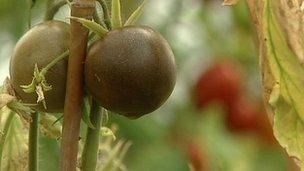Researchers in the East awarded £168m biosciences grant
- Published
The Babraham Institute in Cambridge will use its share to build a new laboratory
Researchers in the east of England have been awarded £168m, part of a £250m investment by the Biotechnology and Biological Sciences Research Council.
Funding worth £90m has been given to the Norwich-based John Innes Centre, Institute of Food Research and Genome Analysis Centre.
The remainder goes to the Cambridgeshire-based Babraham Institute and Rothamsted Research, Harpenden.
Research into feeding a growing world population will benefit from the grant.
This includes a wheat pre-breeding programme at the John Innes Centre (JIC), Rothamsted Research and university partners that will support the development of new varieties of wheat for farmers.
'Bad position'
Prof Mike Bevan, from JIC, said: "The award of this money, and to our sister institutes at the Genome Analysis Centre and Food Research Centre, are incredibly important for our future.
"It will enable us to retrain approximately 400 staff over five years.

Research into feeding a growing world population will benefit
"Without this investment in developing new knowledge we would be in a very bad position in a few years time.
"We would not be commercially competitive, our industries would wither and most important food security would be placed at risk."
The funding was announced earlier by David Willetts, the Minister for Universities and Science.
He said: "This investment from the Biotechnology and Biological Sciences Research Council (BBSRC) for the first phase of major five-year research programmes will sustain excellent science at some of the UK's leading institutes and universities.
"This will drive growth, support highly skilled jobs and keep the UK at the very forefront of bioscience, with benefits ranging from healthcare to energy and global food security."
In Cambridgeshire, the grant will help the Babraham Institute study the role of lymphocytes (type of white blood cell) in the immune system and their implications for supporting healthy longer lives as the population ages.
It follows a £44m <link> <caption>BBSRC investment in 2011</caption> <url href="http://www.bbc.co.uk/news/uk-england-cambridgeshire-12839617" platform="highweb"/> </link> awarded to the research campus for new research and development buildings.
Councillor Nick Wright, South Cambridgeshire District Council's cabinet member for planning and economic development, said: "This investment is a huge boost to the area and shows how important South Cambridgeshire science and innovation businesses are nationally."
- Published23 April 2012
- Published12 January 2012
- Published5 June 2011